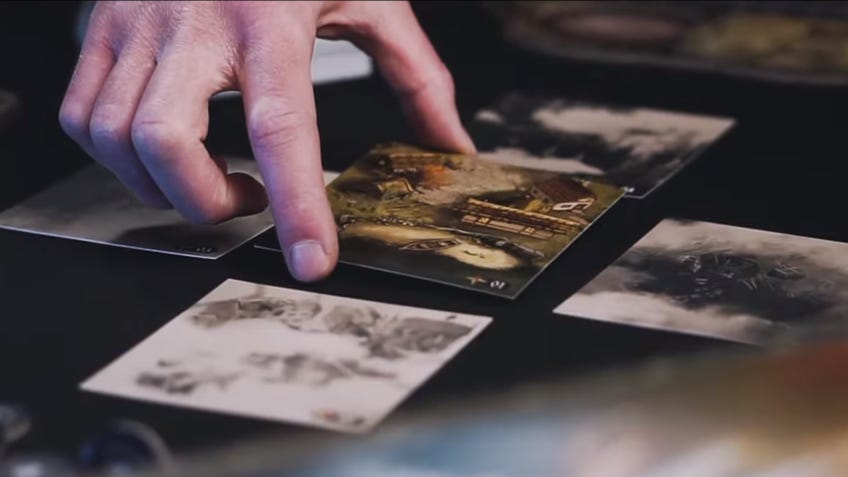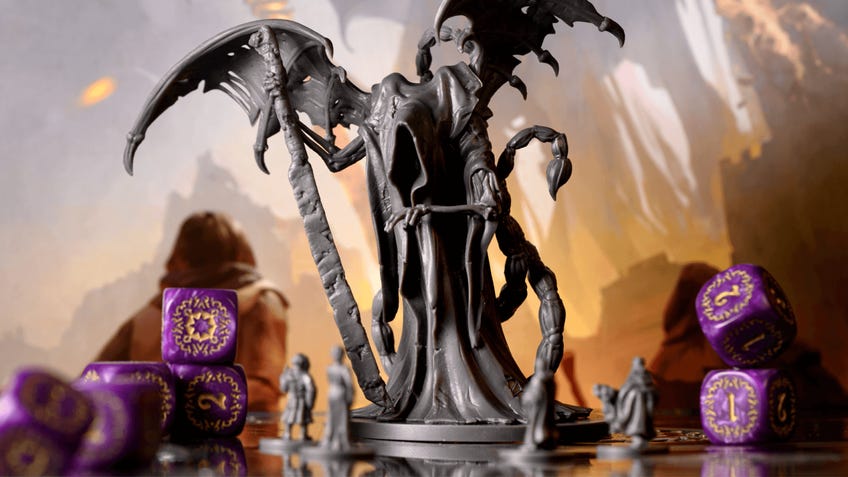Destinies mixes a digital app with a competitive board game that prioritises player choice
Launching under a slightly different name from its Kickstarter.
Explore a dark medieval world wherein every action can alter one’s ultimate fate in Destinies, a new competitive board game that uses a digital app and scannable cards to provide a replayable, choice-drive narrative experience.
Published by Lucky Duck Games (Calico, Dune: Imperium) and developed by Michał Gołębiowski and Filip Miłuński, Destinies provides its own spin on app-assisted board games by slapping a scannable code on nearly every card, along with some other elements, that affects the branching story players will experience over the course of a roughly two-and-a-half hour session.
Specifically designed for three players, the title pits each in a race to be the first to realise the unique destiny tied to their chosen class. While the world is decidedly fantasy - and a grim one at that with monsters, plagues, war and other calamities - players take on the mantle of common folk who might be on the path to becoming epic heroes. Paladins were once foot soldiers; druids were once healers - these stories focus on small decisions that lead to grand conclusions.
The world is represented by square tiles that characters can explore on their turn by flipping them over. They won’t know what encounters wait on the other side until they’re well and truly involved, and the events run the gamut from helpful NPCs offering aid to a werewolf den just in time for dinner. Choices made in critical moments like these might seem inconsequential, but Destinies advertises far-reaching circumstances that may alter the end of the session and beyond. The example used on the Lucky Duck’s website describes treating a wounded druid or torching their grove from afar, each setting that player on a widely divulging path.
Mechanically, this looks like taking the card associated with the event and scanning it using a phone or tablet with Destinies’ associated digital app. Outcomes will award experience and items but also describe the narrative events they helped create. Characters boast a range of classic fantasy statistics - strength and dexterity, for example - that are used to decide whether they succeed or fail in certain tests. Alongside that is Virtue, a measure of their moral fibre that might lock or unlock specific story branches. Nobody wants to talk to a known thief, unless it's an invitation to the local criminal guild.
The recent launch trailer shows the board and game pieces - which includes 31 miniatures - in a style reminiscent to slow-motion food chopping videos or extremely stylish fashion modeling. The QR codes are clearly visible on the cards, character boards and other scannable pieces but don’t look overly obtrusive - the size and layout allow plenty of room for rules text and artwork.

The base game comes packaged with five scenarios that each support three intentionally chosen character classes. Sessions will lead players to one of two possible destinies at the end, and Lucky Duck Games describes those fates as “intertwined with one another” from a story perspective. Destinies will also support a solo Explorer mode, as well as a timed Challenge mode meant to increase the difficulty for experienced players.
Destinies first launched on Kickstarter in 2020 as Time of Legends: Destinies and positioned itself as a new board game set in the same world as Pascal Bernard’s Time of Legends: Joan of Arc. Lucky Duck Games updated the Kickstarter page on July 29th of that same year to explain that “recent negotiations” between Bernard, Lucky Duck and Time of Legends’ publisher Mythic Games led to the name being changed to Destinies, along with any tie-in content dropped from development.
Pre-orders for Destinies is currently available on Lucky Duck Game’s website for $50/£28, and shipping will begin on June 4th to line up with the game’s retail release. An expansion - Destinies: Sea of Sand - is also available for pre-order and takes the base game out of frigid medieval Europe-esque fiefdoms and into “the sands of North Africa.”

